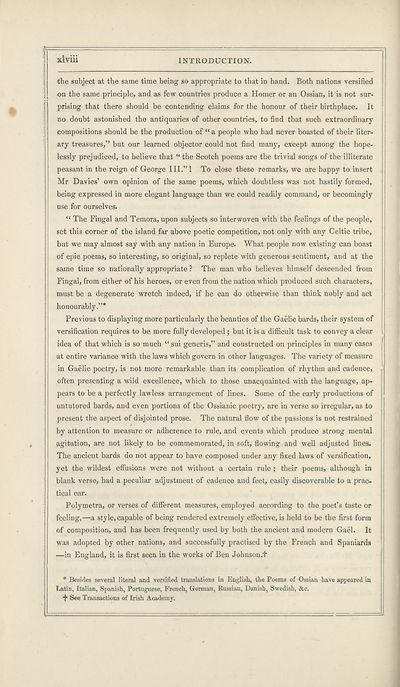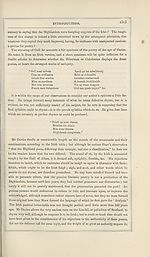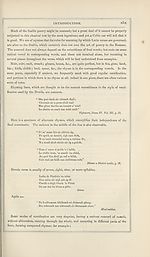Books and other items printed in Gaelic from 1871 to 1900 > Sar-obair nam bard gaelach, or, The beauties of Gaelic poetry, and lives of the Highland bards
(62) Page xlviii
Download files
Complete book:
Individual page:
Thumbnail gallery: Grid view | List view

xlviii INTRODUCTION.
the subject at the same time being so appropriate to that in hand. Both nations versified
on the same principle, and as few countries produce a Homer or an Ossian, it is not sur¬
prising that there should be contending claims for the honour of their birthplace. It
no doubt astonished the antiquaries of other countries, to find that such extraordinary
compositions should be the production of “ a people who had never boasted of their liter¬
ary treasures,” but our learned objector could not find many, except among the hope¬
lessly prejudiced, to believe that “the Scotch poems are the trivial songs of the illiterate
peasant in the reign of George III.” ! To close these remarks, we are happy to insert
Mr Davies’ own opinion of the same poems, which doubtless was not hastily formed,
being expressed in more elegant language than we could readily command, or becomingly
use for ourselves.
“ The Fingal and Temora, upon subjects so interwoven with the feelings of the people,
set this corner of the island far above poetic competition, not only with any Celtic tribe,
but we may almost say with any nation in Europe. What people now existing can boast
of epic poems, so interesting, so original, so replete with generous sentiment, and at the
same time so nationally appropriate ? The man who believes himself descended from
Fingal, from either of his heroes, or even from the nation which produced such characters,
must be a degenerate wretch indeed, if he can do otherwise than think nobly and act
honourably.”*
Previous to displaying more particularly the beauties of the Gaelic bards, their system of
versification requires to be more fully developed; but it is a difficult task to convey a clear
idea of that which is so much “ sui generis,” and constructed on principles in many cases
at entire variance with the laws which govern in other languages. The variety of measure
in Gaelic poetry, is not more remarkable than its complication of rhythm and cadence,
often presenting a wild excellence, which to those unacquainted with the language, ap¬
pears to be a perfectly lawless arrangement of lines. Some of the early productions of
untutored bards, and even portions of the Ossianic poetry, are in verse so irregular, as to
present the aspect of disjointed prose. The natural flow of the passions is not restrained
by attention to measure or adherence to rule, and events which produce strong mental
agitation, are not likely to be commemorated, in soft, flowing and well adjusted lines.
The ancient bards do not appear to have composed under any fixed laws of versification,
yet the wildest effusions were not without a certain rule ; their poems, although in
blank verse, had a peculiar adjustment of cadence and feet, easily discoverable to a prac¬
tical ear.
Polymetra, or verses of different measures, employed according to the poet’s taste or
feeling,—a style, capable of being rendered extremely effective, is held to be the first form
of composition, and has been frequently used by both the ancient and modern Gael. It
was adopted by other nations, and successfully practised by the French and Spaniards
—in England, it is first seen in the works of Ben Johnson.t
* Besides several literal and versified translations in English, the Poems of Ossian have appeared in
Latin, Italian, Spanish, Portuguese, French, German, Russian, Danish, Swedish, &c.
+ See Transactions of Irish Academy.
the subject at the same time being so appropriate to that in hand. Both nations versified
on the same principle, and as few countries produce a Homer or an Ossian, it is not sur¬
prising that there should be contending claims for the honour of their birthplace. It
no doubt astonished the antiquaries of other countries, to find that such extraordinary
compositions should be the production of “ a people who had never boasted of their liter¬
ary treasures,” but our learned objector could not find many, except among the hope¬
lessly prejudiced, to believe that “the Scotch poems are the trivial songs of the illiterate
peasant in the reign of George III.” ! To close these remarks, we are happy to insert
Mr Davies’ own opinion of the same poems, which doubtless was not hastily formed,
being expressed in more elegant language than we could readily command, or becomingly
use for ourselves.
“ The Fingal and Temora, upon subjects so interwoven with the feelings of the people,
set this corner of the island far above poetic competition, not only with any Celtic tribe,
but we may almost say with any nation in Europe. What people now existing can boast
of epic poems, so interesting, so original, so replete with generous sentiment, and at the
same time so nationally appropriate ? The man who believes himself descended from
Fingal, from either of his heroes, or even from the nation which produced such characters,
must be a degenerate wretch indeed, if he can do otherwise than think nobly and act
honourably.”*
Previous to displaying more particularly the beauties of the Gaelic bards, their system of
versification requires to be more fully developed; but it is a difficult task to convey a clear
idea of that which is so much “ sui generis,” and constructed on principles in many cases
at entire variance with the laws which govern in other languages. The variety of measure
in Gaelic poetry, is not more remarkable than its complication of rhythm and cadence,
often presenting a wild excellence, which to those unacquainted with the language, ap¬
pears to be a perfectly lawless arrangement of lines. Some of the early productions of
untutored bards, and even portions of the Ossianic poetry, are in verse so irregular, as to
present the aspect of disjointed prose. The natural flow of the passions is not restrained
by attention to measure or adherence to rule, and events which produce strong mental
agitation, are not likely to be commemorated, in soft, flowing and well adjusted lines.
The ancient bards do not appear to have composed under any fixed laws of versification,
yet the wildest effusions were not without a certain rule ; their poems, although in
blank verse, had a peculiar adjustment of cadence and feet, easily discoverable to a prac¬
tical ear.
Polymetra, or verses of different measures, employed according to the poet’s taste or
feeling,—a style, capable of being rendered extremely effective, is held to be the first form
of composition, and has been frequently used by both the ancient and modern Gael. It
was adopted by other nations, and successfully practised by the French and Spaniards
—in England, it is first seen in the works of Ben Johnson.t
* Besides several literal and versified translations in English, the Poems of Ossian have appeared in
Latin, Italian, Spanish, Portuguese, French, German, Russian, Danish, Swedish, &c.
+ See Transactions of Irish Academy.
Set display mode to:
![]() Universal Viewer |
Universal Viewer | ![]() Mirador |
Large image | Transcription
Mirador |
Large image | Transcription
Images and transcriptions on this page, including medium image downloads, may be used under the Creative Commons Attribution 4.0 International Licence unless otherwise stated. ![]()
| Permanent URL | https://digital.nls.uk/107579390 |
|---|
| Description | Out-of-copyright books printed in Gaelic between 1631 and 1900. Also some pamphlets and chapbooks. Includes poetry and songs, religious books such as catechisms and hymns, and different editions of the Bible and the Psalms. Also includes the second book ever published in Gaelic in 1631. |
|---|

